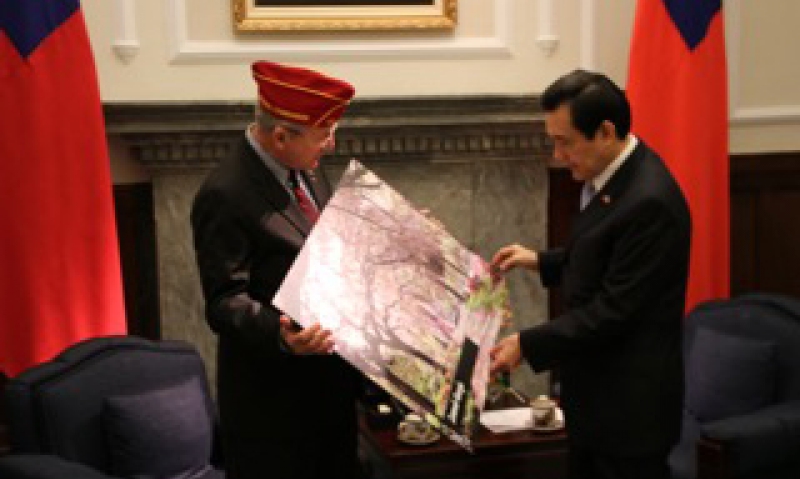
Legion posts on the rise in the Far East
After spending Thanksgiving with the troops in Okinawa, Japan, and continuing his Far East tour in two other countries, American Legion National Commander Dale Barnett is excited about all he is seeing.
But it’s not official meetings with dignitaries and military officials fueling his excitement. It’s the culture of membership growth that he and American Legion Auxiliary National President Sharon Conatser have found at two posts they have visited.
Wayne E. Marchand Post 28 lies just outside one of the entry gates of Marine Corps Base Camp Foster in Okinawa. Chartered in 1946, Post 28 was one of the largest in The American Legion during the height of the Vietnam War. After local military restrictions on off-base social activities were recently lifted, the post is seeing a membership resurgence.
“The post has a good, diverse mix of members of all ages, men and women,” Barnett said. “The highlight of my Okinawa visit was swearing in seven new members to The American Legion – all active duty and under age 30.”
Meanwhile, Post 38 – aptly named for the parallel that divides the two Koreas – was chartered less than a year ago. Founded by retired military members in the Republic of Korea, the post will be celebrating its charter by hosting the national commander’s delegation during a dinner Friday. Post officials are already hoping to expand the Legion by adding more posts to cover U.S. military communities throughout South Korea.
“Because I served overseas, I understand the unique challenges that a military family faces when they leave the United States,” Barnett said. “In a foreign country they need to adjust to a new culture, different languages and just being far from home. That’s why a support group is so important. I’m thrilled that Post 28 in Okinawa and Post 38 in Korea are providing that support to the newest generation of veterans and their families.”
Conatser added that to grow membership in the Legion and Auxiliary, “young people need to see The American Legion together as a family organization. Our missions are the same: to support military members and their families.”
The Legion delegation also met with Taiwan President Ma Ying-jeou, a veteran of his nation’s army, navy and Marine Corps.
“The president was incredible,” Barnett said of Ma. “His knowledge of veterans and the United States is extremely high. We also had a discussion of economic ties between our two countries.”
The Taiwan leg also included visits to a Taiwanese VA hospital and meetings with the country’s VA commission before the delegation arrived in Seoul Monday night.
Barnett and Conatser were briefed by State Department officials at the U.S. Embassy in Seoul Tuesday. U.S. Ambassador to Korea Mark Lippert thanked the Legion for standing up to “the idiocy of sequestration.”
Recalling his previous position as the chief of staff to then Defense Secretary Chuck Hagel, Lippert said, “The American Legion was a responsible voice without piling on. You recognized sequestration was a bad situation. Secretary Hagel really appreciated your voice.”
Later this week, Barnett and Conatser will visit troops serving in the demilitarized zone and meet with officials at Samsung Corp. in Seoul. Samsung provided a $5 million endowment to The American Legion in 1995 for the establishment of scholarships for family members of U.S. war veterans.
